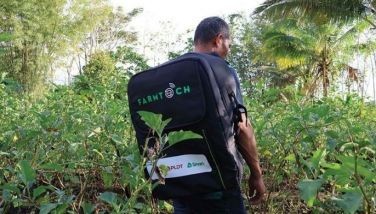BPI eyes P7.3-B income this year
April 8, 2005 | 12:00am
The Bank of the Philippine Islands (BPI) could earn at least P7.3 billion this year once it disposes of roughly P5 billion to P6 billion worth of non-performing assets (NPAs).
In their annual stockholders meeting yesterday, BPI president Aurelio R. Montinola III said this year’s growth drivers for the bank will be as diverse as the markets it serves.
"BPI has a diversified income stream and several business vehicles to draw for growth," Montinola said.
But he admitted that disposing of the NPAs would allow the bank to realize its income goals this year.
Of the total P6-billion NPAs for disposal this year, almost half are non-performing loans (NPLs) and the rest are real and other properties owned or acquired (ROPOAs). As of end 2004, its ROPOAs stood at P17 billion.
Senen L. Magtoto, BPI senior vice president and head of the Asset Recovery and Management Group, said that they are eyeing a net ROPOA sale of P1 billion but anticipate new ROPOAs of between P2 to P3 billion as part of its business and lending activities.
He said they will explore more opportunities in disposing of the bad assets, including forming joint ventures with property developers, holding public auctions, retail sales, and the special purpose vehicle (SPV).
"With or without the extension of the SPV law, we will continue to sell the bad assets as we planned," Magtoto added.
Last year, BPI disposed of P8.6 billion in bad assets via the SPV route and formed a joint venture with sister company Ayala Land Inc. in several Ayala-Alabang properties.
Meanwhile, BPI chairman Jaime Augusto Zobel de Ayala revealed that Mitsui Sumitomo had sold 149 million BPI shares for $132 million.
He said 48 percent of the 149 million shares was acquired by European investors, 26 percent by US investors, 18 percent by Philippine investors (including Ayala Corp.), seven percent by other Asian investors, and one percent by Latin American investors.
The country’s second largest commercial bank reported a net income of P5.7 billion in 2003, or 10 percent better than the P5.2 billion in 2002.
In their annual stockholders meeting yesterday, BPI president Aurelio R. Montinola III said this year’s growth drivers for the bank will be as diverse as the markets it serves.
"BPI has a diversified income stream and several business vehicles to draw for growth," Montinola said.
But he admitted that disposing of the NPAs would allow the bank to realize its income goals this year.
Of the total P6-billion NPAs for disposal this year, almost half are non-performing loans (NPLs) and the rest are real and other properties owned or acquired (ROPOAs). As of end 2004, its ROPOAs stood at P17 billion.
Senen L. Magtoto, BPI senior vice president and head of the Asset Recovery and Management Group, said that they are eyeing a net ROPOA sale of P1 billion but anticipate new ROPOAs of between P2 to P3 billion as part of its business and lending activities.
He said they will explore more opportunities in disposing of the bad assets, including forming joint ventures with property developers, holding public auctions, retail sales, and the special purpose vehicle (SPV).
"With or without the extension of the SPV law, we will continue to sell the bad assets as we planned," Magtoto added.
Last year, BPI disposed of P8.6 billion in bad assets via the SPV route and formed a joint venture with sister company Ayala Land Inc. in several Ayala-Alabang properties.
Meanwhile, BPI chairman Jaime Augusto Zobel de Ayala revealed that Mitsui Sumitomo had sold 149 million BPI shares for $132 million.
He said 48 percent of the 149 million shares was acquired by European investors, 26 percent by US investors, 18 percent by Philippine investors (including Ayala Corp.), seven percent by other Asian investors, and one percent by Latin American investors.
The country’s second largest commercial bank reported a net income of P5.7 billion in 2003, or 10 percent better than the P5.2 billion in 2002.
BrandSpace Articles
<
>
- Latest
- Trending
Trending
Latest





























